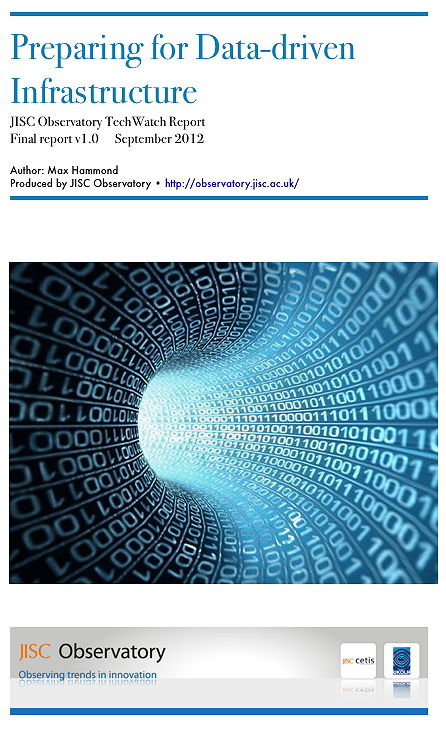Launch of JISC Observatory Report: Preparing for Data-driven Infrastructure
 The JISC Observatory has published the latest TechWatch report on Preparing for Data-driven Infrastructure, which highlights approaches institutions should consider if they wish to exploit a data-driven infrastructure.
The JISC Observatory has published the latest TechWatch report on Preparing for Data-driven Infrastructure, which highlights approaches institutions should consider if they wish to exploit a data-driven infrastructure.
In light of increasing requirements for Higher Education institutions to manage their data more effectively, we are seeing a move in systems design towards a ‘data-centric architecture‘. For example, the requirement by HEFCE for institutions to publish Key Information Sets (KIS) data provides one example of the move towards greater transparency for institutional business processes. The detailed reporting required in the Research Excellence Framework (REF) serves as another example.
Within this context of increasing regulation from government and changing requirements from Higher and Further Education agencies and other stakeholders, institutions need to find a sustainable approach to managing data.
To meet the new regulatory requirements in an efficient and sustainable way, the HE sector has seen the emergence of innovative approaches to ‘data-driven infrastructure’ where it is access to data (from institutions and agencies) that determines the shape and function of that infrastructure.
As our HE institutions face increasing requirements to manage data more effectively, this could mean, for some institutions, a shift in emphasis in systems design towards a ‘data-centric architecture’. In any case, if our institutions are to exploit an emerging data-driven infrastructure, they will need to understand what this entails.
The JISC Observatory’s report on Preparing for Data-driven Infrastructure highlights approaches which institutions can take in responding to these strategic drivers in order to adopt a more data-centric approach. The report includes a description of data-centric architectures and an overview of tools and technologies (including APIs, Linked Data and NoSQL) together with a review of architectural approaches which institutions will need to consider.




